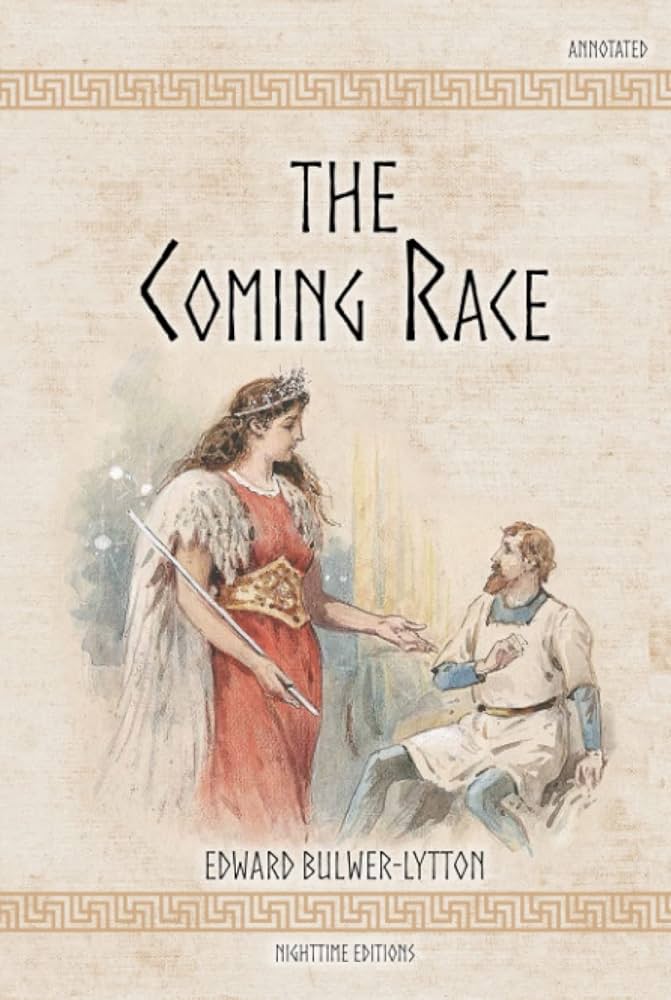Chapter XXVII — The coming Race
byChapter XXVII brings a shift in atmosphere, as a simple desire for reflection turns into something more ominous. I had intended only a quiet walk with Taee, a soul whose youth made him easier to speak with than the dignified elders of his kind. Yet even in that, the lines between our worlds refused to blur. My suggestion to revisit the spot of my first descent was made with a calm curiosity. Taee, uncharacteristically serious, agreed without hesitation. His solemn nod told me something unknown was beginning to stir beneath the calm.
As we stepped outside the city’s graceful arches, the world felt eerily tranquil. We were met by a group of Gy-ei returning from the fields, their arms full of vivid blooms, their voices rising in song. Their singing, melodic and effortless, seemed to merge with the atmosphere, as though the air itself had been taught to carry music instead of mere sound. They greeted us with a warmth both disarming and elegant. Their manner toward me was not patronizing but gently deferential, treating me not as alien, but as a guest of some esteem. Compared to the brash, flirtatious airs common in my homeland, their chivalry felt oddly aristocratic. Yet even in their sweetness, there was an unspoken barrier.
One among them stood out—Taee’s sister, a figure both striking and composed, descended with sudden swiftness from the sky. Her directness startled me. She questioned why I had not joined their gatherings, her tone not cruel, but piercing in its honesty. I hesitated to answer, unsure how to navigate this social structure that seemed at once intimate and distant. But Taee responded on my behalf, gently correcting her. His words were not harsh, but firm, reminding her of the balance her station required. The correction, though minor, brought a blush to her cheek and a bowed head.
It was then that the tone of the day darkened. The chief magistrate approached without a sound, and yet his presence was unmistakable. His face, calm and pale, held a gaze that seemed to strip the world of its softness. There was no cruelty in his eyes, yet something more dangerous lingered—certainty. His appearance was not random. Though he smiled faintly, I felt the shadow of judgment pass through me. My blood cooled, my heart tightened, though no words were yet spoken. This was not just another encounter; it was a summons in disguise.
His energy was different from the others—unhurried, almost holy. And in that moment, I understood how power works in this world. It does not announce itself. It simply arrives, and you understand its meaning without explanation. I had seen such confidence before in generals and kings, but here it came paired with something deeper—a moral authority that claimed to answer not to people, but to principle. Standing before him, I no longer felt like a visitor. I felt like a trespasser.
Our earlier joy now seemed like a distant echo. The Gy-ei had gone silent. Even the air felt heavier. Though nothing explicit was said, I knew some kind of decision had been made, and I would soon feel its weight. Taee, for all his usual brightness, avoided my gaze. His silence screamed louder than words. There are times when language becomes unnecessary—when the truth reveals itself by absence. This was one such moment.
Still, I tried to rationalize what was happening. I told myself the chief’s appearance was coincidence. But deep down, that comfort was hollow. No step in this society is made without purpose. Even kindness is measured. Even curiosity is evaluated. I had been studied, judged, and now, possibly sentenced—though no charge had been made.
What made it more terrifying was the civility of it all. There would be no outburst, no dramatic arrest, no shouting. If they were to act, it would be clean, final, and serene. I realized then that the most dangerous force is not chaos, but perfect order. Chaos can be reasoned with. But order, absolute and unmoving, allows no appeal.
In the moments that followed, I walked beside Taee with a stillness I did not feel. My thoughts were racing, but my feet moved on instinct. I did not know what lay ahead, only that the world I had wandered into had finally turned its gaze inward. Whatever patience they had shown, I now sensed its end approaching. And still, I held onto hope, thin and trembling as it was. Not for escape, but for understanding. Because to understand them—truly—might be the only way to survive them.


